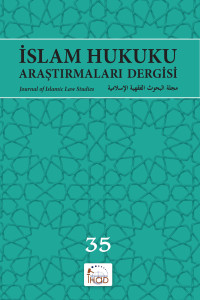Abstract
Toplumumuzu oluşturan dinî, ahlaki ve sosyal değerler önemli ölçüde Sünni inanç, Hanefi fıkıh ve tasavvufi ahlak anlayışına dayanmaktadır. Osmanlı Devleti’nin de desteklediği bu anlayışı temsil eden medrese ve ilim adamları devletin kuruluş döneminden itibaren Sünni, Hanefi ve tasavvufi geleneği yeşertmek ve yaymak için faaliyette bulunmuş ve eser vermişlerdir. Orhan Gazi’nin kurduğu İznik Medresesi ve bu medreseye atanan müderrisler bu anlayışı yerleştirmede önemli bir rol oynamıştır. Bu müderrislerin en önemlilerinden ve ilklerinden biri, Alâeddin Esved’dir. Bu makalede Esved ve onun fıkıh usulü alanındaki anlayışını, başka bir ifadeyle metodolojisini ortaya koyan iki eserinden birisi Künûzü’l-envâr tanıtılmış ve kısaca tahlil edilmiştir. Bu eser ilk defa bir akademik makalede ele alınmıştır. Bu vesileyle şerh literatürüne ait olan bu eserin metnini oluşturan ve henüz üzerine çalışma yapılmamış olan Ebu Bekir b. İbrahim’in Rumûzü’l-esrâr adlı özgün eseri de kısaca incelenmiştir. Böylece Osmanlı Hanefi fıkıh usulü düşüncesinin tarihi gelişimini tespit etme yolunda bir adım atılmıştır.
Abstract
The religious, moral and social values that make up our society are based on Sunnī belief, Hanafī fiqh and Sufistic moral understanding. Madrasah and scholars representing this understanding supported by the Ottoman Empire have been active and worked to establish and spread the Sunnī, Hanafī and Sūfī traditions since the foundation of the state. Iznik (Nicaea) Madrasah, founded by Orhan Gazi and the professors assigned to this madrasah played an important role in establishing this understanding. One of the most important and first of these professors is Alāaddīn al-Aswad. In this article, Kunūzu’l-envār is introduced and briefly analyzed, which reveals Esved and his understanding in the field of fiqh, in other words, his methodology. This work is discussed for the first time in an academic article. On this occasion, it is the original work of Abū Bakr b. Ibrāhim’s work called Rumūzu’l-asrār was also briefly examined. Thus, a step was taken to determine the historical development of the thought of the Ottoman Hanafī fiqh methodology.
Details
| Primary Language | Turkish |
|---|---|
| Subjects | Religion, Society and Culture Studies |
| Journal Section | Research Articles |
| Authors | |
| Publication Date | April 30, 2020 |
| Submission Date | November 1, 2019 |
| Published in Issue | Year 2020 Issue: 35 |



